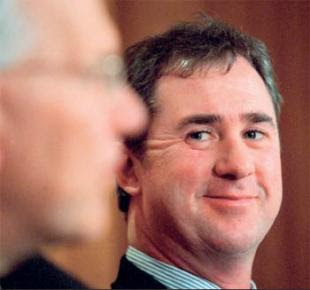
Tim May: "FICA's top priority is to ensure that the ICC remains an independent body"...
Tim May, the chief executive of FICA, the international players' association, has termed it unfortunate that players from India, the most powerful cricket centre in the world, do not feel the need to form an effective national players' association.
"It would be ideal if the Indian cricketers decided among themselves that they want a players' association," May told Cricinfo. "Unfortunately, players in India don't seem to feel that need. Perhaps, it's culturally different in India vis a vis employee-employer relationships. But yes, it will be better for all if India has an effective players' association. FICA can facilitate it, if it comes to that. But there has to be a need first.
"I believe that Indian players historically have learnt that it's in their best interests not to make their views public because it may be contrary to the BCCI's position," May said, suggesting that a stronger player unity could have avoided the recent fall-out with regard to the Indian Cricket League.
May, the former Australian offspinner, said that hopes of a common-sense resolution were receding for players banned for their contact with the unofficial ICL, and soon the only option left would be to approach the courts. "If the players in the ICL are serious about a resolution, they would finally have to go to an independent third party, which in this case would be the courts," he said. "I believe right now, they are waiting for a common-sense resolution. But unfortunately, their appeals have fallen on deaf ears. It's clear that a common-sense resolution is fading by the minute, and it's just a matter of time before things reach the court."
May is currently in Panchkula, near Chandigarh in Punjab, on an invitation from the ICL. He indicated that sorting out the ICL issue, especially the "unfair restrictions" that have been placed by national boards on players who are part of the unofficial venture, was a huge priority for FICA.
-------------------------------------------------------------------------------------
If the players in the ICL are serious about a resolution, they would finally have to go to an independent third party, which in this case would be the courts
-------------------------------------------------------------------------------------
May also pointed to a worldwide perception that the Indian board wields a strong influence over world cricket affairs and said that the top priority for the players' association is to ensure the ICC remains an independent body capable of taking impartial decisions.
"There is a perception that the BCCI's power influences some of the ICC's decisions," he said. "Any sport needs to be run by a thoroughly independent body, and no competition should be run by the power of one competitor. This is not a personal attack against the BCCI but FICA's top-most priority, going ahead, is to ensure that the ICC remains an independent body capable of taking impartial decisions." May said the players' body would be keenly tracking the ICC executive board meeting in Dubai on March 17, especially the selection of its chief executive - India's IS Bindra is one of the leading candidates.
Outlining FICA's priorities in the near future, May said that a lot of thought would be given to the direction in which the game is headed and how that would affect cricketers.
"We also need to ask ourselves how we are shaping the game," he said. "There is this new product out there, Twenty20, which is immensely popular. So how do we protect Test cricket or one-day cricket? Do we need to protect them at all? The FICA believes that the ICC and the players' association needs to sit together, get the facts out on the table, call in the TV experts, analyse the ratings, and take informed decisions."
He also agreed that the recent controversies over sledging, especially during the recent India-Australia series, had the potential to harm player relations. "There is a line on the sand you should not cross. But it has been crossed in the last six months. First, players and the ICC referees have to be clear that this is the line and if you cross that, you will be charged. But finally, it's up to the on-field umpires."
Saturday, March 15, 2008
India should have players' association - May
Posted by
Faizan Rasool
at
2:58 PM
![]()
![]()




